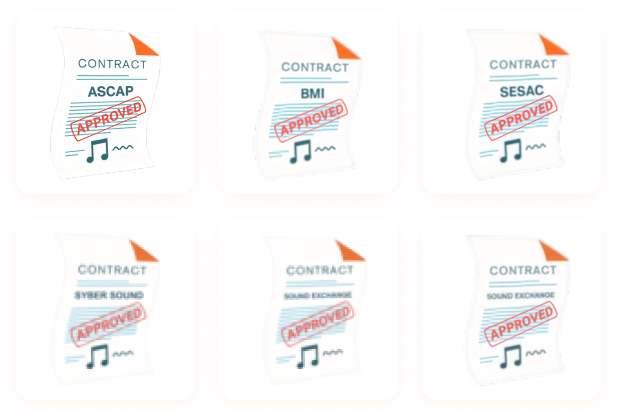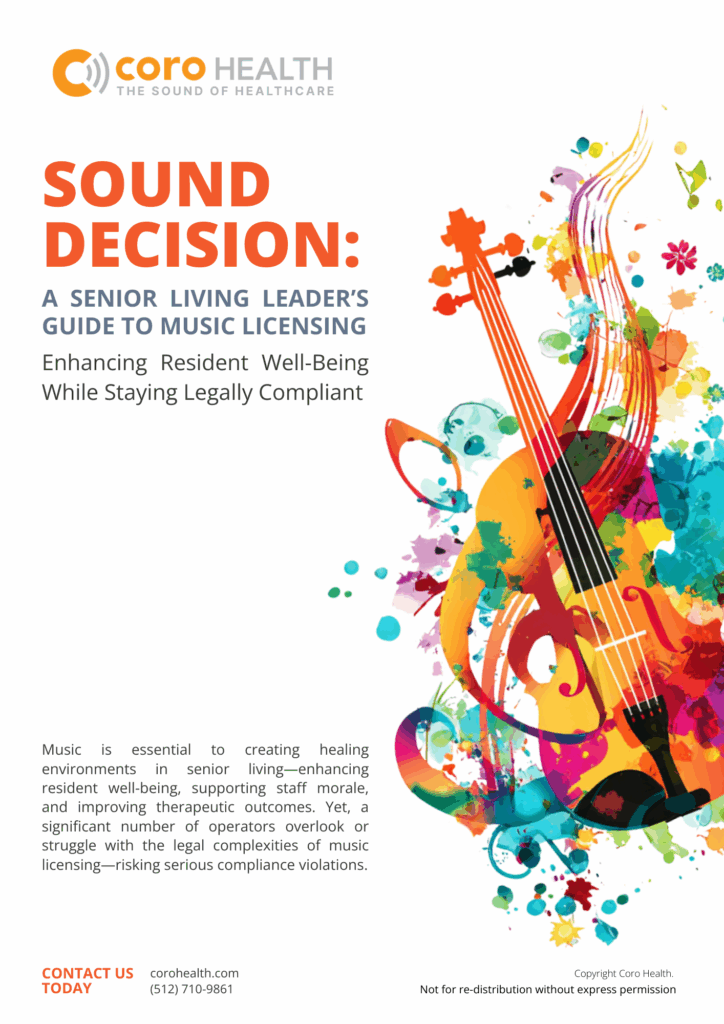Music Licensing Can
Get Complicated.
Coro Health Keeps It Simple.

A simple solution for music licensing. Learn how Coro Health minimizes the threat of fines and lawsuits.

Fully-licensed programming for peace of mind
Included in any agreement with Coro Health is the assurance that every single song in MusicFirst’s vast, genre-spanning archive is fully-licensed to ensure artists and rights holders are paid for their work — maintaining compliance with copyright laws, and protecting from the threat of fines or lawsuits.
A simple solution for music licensing. Learn how Coro Health minimizes the threat of fines and lawsuits.


Get Your Music Licensing Guides
for Senior Living & Acute Care
Music brings comfort, connection, and emotional support, but without the proper licenses, it can also bring costly fines or legal issues. To help you navigate it with clarity, we’ve created two essential guides


Fill the form to get your Music Licensing Guide.

What are public performance rights? Who needs them?
Every time a piece of music is performed in public — live or recorded — the creator has a right to collect royalties for that performance. Senior communities, long-term care facilities and hospitals are considered public places under the US Copyright Act, which means administrators are responsible for obtaining licenses for any music played on site.

What are the major licensing entities? Where does the money go?
Music licenses are granted by performance rights organizations; the largest and best-known are ASCAP, BMI and SESAC. Each organization owns the rights to its own unique catalog of songs. Every time a song is licensed for public performance a percentage of the fee goes directly back into the pocket to the song's creator.

Can I be sued for non-compliance?
Organizations have, in recent years, become more aggressive enforcing their rights: ASCAP filed suit against a facility in Iowa for playing Frank Sinatra without the proper license during a karaoke event, and BMI sued — for more than one million dollars — a separate facility for unauthorized use of "Conga" by the Miami Sound Machine, among other songs.

A simple solution for music licensing
Learn how Coro Health minimizes the threat of fines and lawsuits while ensuring your residents enjoy beautiful, fully-licensed music.

Are there any exceptions?
U.S copyright law includes limited exceptions for specific educational, devotional, charitable and promotional purposes.
Organizations curious about their status are advised to review their eligibility with their lawyers.

A simple solution for music licensing
Learn how Coro Health minimizes the threat of fines and lawsuits while ensuring your residents enjoy beautiful, fully-licensed music.

Are there any exceptions?
U.S copyright law includes limited exceptions for specific educational, devotional, charitable and promotional purposes.
Organizations curious about their status are advised to review their eligibility with their lawyers.

What are public performance rights? Who needs them?
Every time a piece of music is performed in public — live or recorded — the creator has a right to collect royalties for that performance. Senior communities, long-term care facilities and hospitals are considered public places under the US Copyright Act, which means administrators are responsible for obtaining licenses for any music played on site.

What are the major licensing entities? Where does the money go?
Music licenses are granted by performance rights organizations; the largest and best-known are ASCAP, BMI and SESAC. Each organization owns the rights to its own unique catalog of songs. Every time a song is licensed for public performance a percentage of the fee goes directly back into the pocket to the song's creator.

Can I be sued for non-compliance?
Organizations have, in recent years, become more aggressive enforcing their rights: ASCAP filed suit against a facility in Iowa for playing Frank Sinatra without the proper license during a karaoke event, and BMI sued — for more than one million dollars — a separate facility for unauthorized use of "Conga" by the Miami Sound Machine, among other songs.

A simple solution for music licensing
Learn how Coro Health minimizes the threat of fines and lawsuits while ensuring your residents enjoy beautiful, fully-licensed music.

What are public performance rights? Who needs them?
Every time a piece of music is performed in public — live or recorded — the creator has a right to collect royalties for that performance. Senior communities, long-term care facilities and hospitals are considered public places under the US Copyright Act, which means administrators are responsible for obtaining licenses for any music played on site.

What are the major licensing entities? Where does the money go?
Music licenses are granted by performance rights organizations; the largest and best-known are ASCAP, BMI and SESAC. Each organization owns the rights to its own unique catalog of songs. Every time a song is licensed for public performance a percentage of the fee goes directly back into the pocket to the song's creator.

Can I be sued for non-compliance?
Organizations have, in recent years, become more aggressive enforcing their rights: ASCAP filed suit against a facility in Iowa for playing Frank Sinatra without the proper license during a karaoke event, and BMI sued — for more than one million dollars — a separate facility for unauthorized use of "Conga" by the Miami Sound Machine, among other songs.

Are there any exceptions?
U.S copyright law includes limited exceptions for specific educational, devotional, charitable and promotional purposes.
Organizations curious about their status are advised to review their eligibility with their lawyers.
Music Licensing FAQ for Healthcare Communities
Informational only – Coro Health does not provide legal advice
If you are a direct customer of Coro Health, we will cover all your music licensing for the use of our product. We report your community’s name and location to all the major music licensing organizations within the United States. You will need to obtain additional licensing for playing music through any other system outside of Coro Health. To potentially avoid these extra costs, use Coro Health exclusively for all your music requirements.
Music licensing ensures that healthcare communities are legally compliant when playing music, as required by U.S. copyright law (Title 17 of the U.S. Code). It makes sure that artists, songwriters, and music publishers are fairly compensated for their work, which is used to enhance the atmosphere and benefit residents within the community.
PROs like ASCAP, BMI, GMR, and SESAC collect royalties for public performances of music. They ensure that songwriters, composers, and publishers receive royalties whenever their music is played in a public space.
No, communities may need licenses from multiple PROs since each one represents different music catalogs. Ensuring coverage from ASCAP, BMI, SESAC, and GMR can avoid gaps in compliance.
Hospitals, long-term care communities, independent living communities, clinics, etc. typically require music licenses. Licensing depends on whether music is publicly accessible within the community and how it's being used. Individual consumption on a device owned by the user does not require additional licensing by the community.
Establishing agreements with all licensing agencies can take up to several months, depending on the complexity of the community’s music use. Licenses usually need to be renewed annually.
Healthcare communities without proper music licenses face fines ranging from $10,000 to $100,000+ per violation, with potential legal fees adding another $5,000 to $50,000+. Additionally, they may owe back payments for past unlicensed use, along with interest, and risk significant reputational damage, making licensing a more cost-effective and responsible choice.
Foreground & background music in common areas, dining rooms, activity classes, etc. Any music played outside of a private resident's room is considered a public performance, necessitating a music license.
Yes, royalty-free music can be used as an alternative, but it must be sourced from reputable providers who offer licensing that explicitly covers public use. Royalty-free music can be a cost-effective option, but it may limit the variety of music available for residents.
Consumer streaming services like Spotify, Apple Music, and Pandora generally have licenses that allow individual users to stream music privately. This means that communities need to obtain separate licenses from PROs like ASCAP, BMI, SESAC, and GMR to legally play music in public spaces. Some streaming services do offer a business or enterprise licensing option at an additional cost.
Sign up for our newsletter
Get the latest updates on music licensing requirements, healthcare regulations, and best practices for creating caring environments with music.
We respect your privacy. Unsubscribe at any time.
Join the Standard in Healthcare
Partner with the category leader trusted by 6000+ healthcare communities.
Experience the turnkey platform that delivers measurable clinical
outcomes.
- Fully-licensed music streaming service
- Vast library of original music and faith content
- Turnkey setup with complete training included
